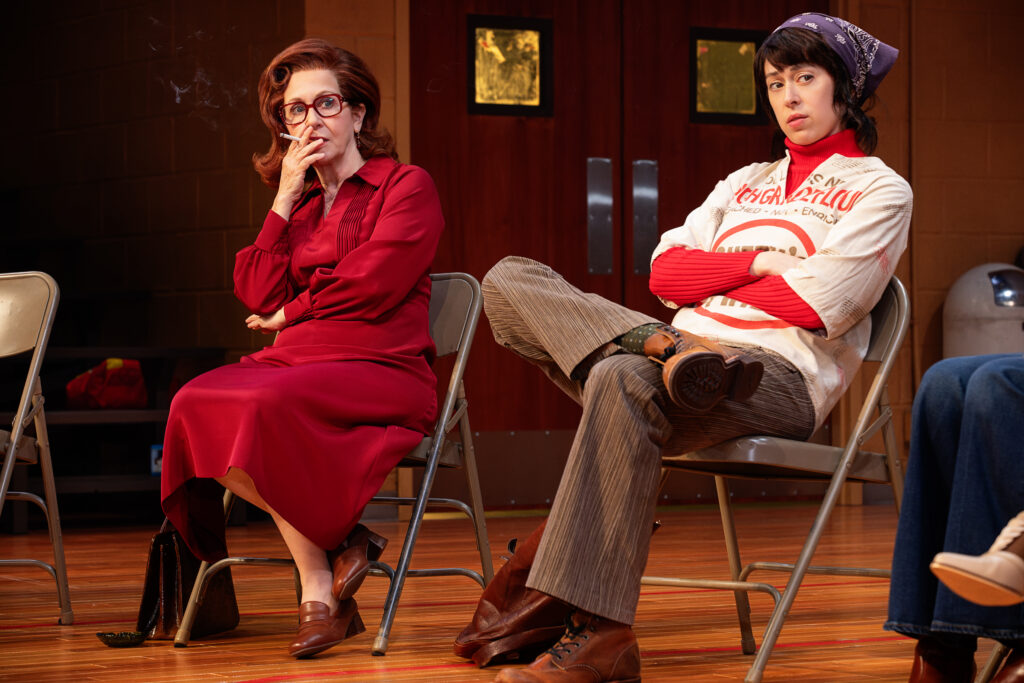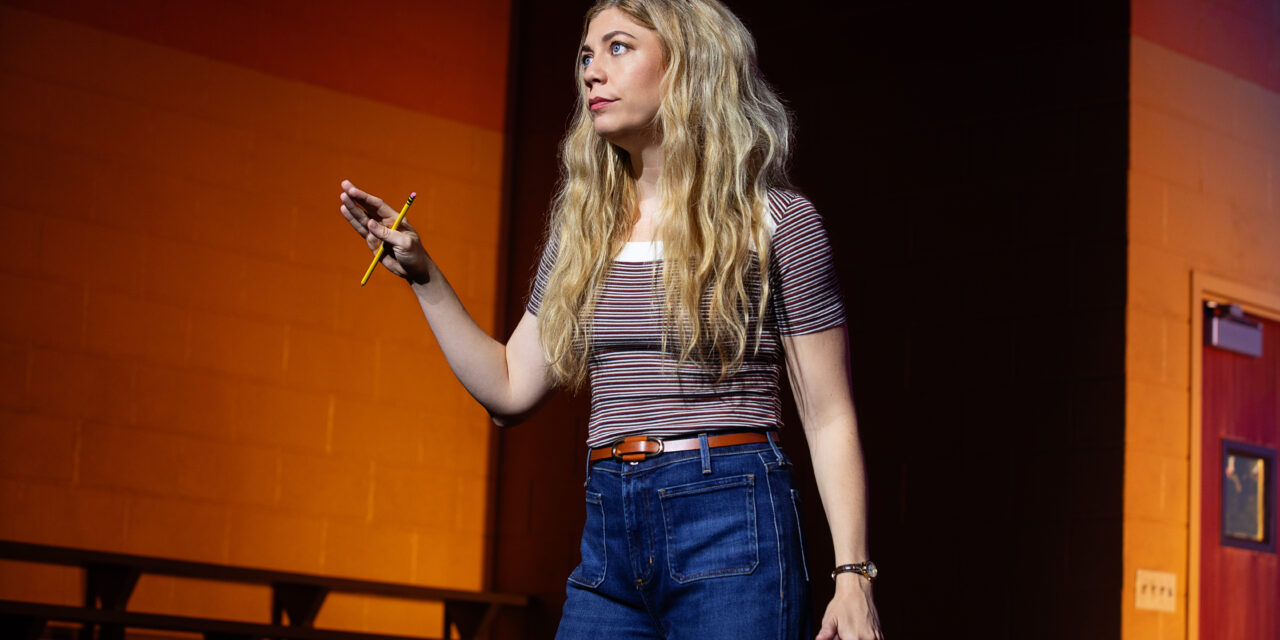Review by Ron Fassler . . .
“This is a play about my mother. For my mother. Who recently . . . who’s not here anymore. And so, it’s about her, and her friends, her beautiful friends—and a thing—this is important—a thing they tried very hard to do.”
“No, a thing that they did, that they unquestionably did— so why does it feel somehow like it’s all slipping away? And how do we get it back.”
These words, spoken at the very beginning of Bess Wohl’s striking drama Liberation, which opened on Broadway Tuesday night, come from a character inhabited by a middle-aged woman (Susannah Flood), who we’ll come to know well. Having first opened this past January at the Roundabout’s 424-seat Laura Pels Theatre on West 46th Street, it has now re-opened with its entire 8-person cast intact just two blocks over at the James Earl Jones Theatre on West 48th Street. Not only does it play just as intimately in a house built for a thousand, but the actors have all grown in their roles, enriching them with commitment, passion and humor (a lot of humor). There is also significant nudity that is in no way gratuitous, but should be noted is adult in nature and strictly for mature audiences. I felt the anguish of the twelve or thirteen-year-old boy across the aisle from me who had his head in his hands throughout the entire sequence.
Previous plays of Wohl’s such as Small Mouth Sounds (2015), Grand Horizons (2020), and Camp Siegfried (2022), lifted me spiritually and intellectually with the playwright’s inspired knack for unpretentious and refreshing dialogue. Liberation, a more personal dive, treads on Wohl’s own relationship with her mother by way of a memory device. Fifty-five years after the fact, a daughter’s curiosity leads her to question how her recently deceased mother went from a woman once at the forefront of progress to taking a backseat as a doting wife who raised five children. Traveling back in time to an Ohio town in 1970, the audience is a massive fly on the wall of a consciousness raising group Lizzie formed to explore women’s liberation issues. This allows the daughter to step in and out of the action as narrator as well as portraying her own mother.

The women of the group include the eldest, Margie (Betsy Aidem), in something of a dead-end marriage who is at a loss now that her adult children have left the house. Alone, save for an emotionally distant and uncaring husband, she struggles both spiritually and emotionally (“I’m here because I need things to get me out of the house so I don’t stab him to death”). Celeste (Kristolyn Lloyd) is a highly educated Black woman at war with her sexuality whose frostiness hides profound sensitivity; Susan (Adina Verson), as one of the two youngest, is most in touch with being liberated but has also taken to sleeping in her car; and the two Doras, Isidora (Irene Sofia Lucio), an Italian immigrant in a Green Card marriage, and Dorothy (Audrey Corsa) who, like Susan, is in her early twenties and dealing with things in the workplace that were all-too-common in the early 70s. It is to Wohl’s credit that we come to know all of them in full portraits, without the writing becoming embroidered in detailed minutia. It’s a case of broad strokes that yield maximum results.
Even though the play puts women’s issues at the forefront it does so by assiduously avoiding preachiness. The deftness and light touch are in the expert hands of director Whitney White, who does a terrific job in the staging with restraint that allows for a fine blending of comedy and drama. Having made her Broadway debut with 2023’s Jaja’s African Hair Braiding, for which she was nominated for a Tony Award, the similar ensemble work here should result in another directing nomination come spring. I also expect nominations for the performances of Susannah Flood as Lizzie and Betsy Aidem as Margie, who embody their roles with such truth and forcefulness that they seem indispensable to this production’s success.
The entire cast are each given moments to shine, especially Kayla Davion, who appears as a mother looking for her son’s backpack where the play is set—in the basement basketball court at a local rec center—only to reemerge later taking over for our narrator to play out a scene with her own mother too uncomfortable for to perform (it’s not as complicated as it sounds). The one male member of the group is played by Charlie Thurston, who does what he can with a part that’s not much more than a prop (hey, it’s okay that duty falls to a man once in a while, right?). The rest of the women, Audrey Corsa, Kristolyn Lloyd, Irene Sofia Lucio, and Adina Verson, are all sublime. No notes.
David Zinn’s set, with its hard wood floor, basketball hoop and mats piled in a corner, reeks of a gymnasium (there are jokes about boys’ hygiene throughout) and the costumes by Qween Jean are dead on. Cha See’s lighting design feels organic to the play even with its frequent goings back and forth between present and past.
There’s a line in the play where one character says, “A woman being uninterrupted is a radical act.” Even though it is spoken by someone in 1970, it’s sadly a situation that still exists in many cases today. But with dramatists like Bess Wohl, a director like Whitney White, and this supreme ensemble of actresses, women’s voices are heard unfiltered, loud and strong. Liberation is theatre that educates and entertains: a winning combination. Don’t miss it.
Liberation is playing at the James Earl Jones Theatre, 138 W 48th Street, NYC. Tickets are being sold through January 11, 2026. For further information, please visit: https://liberationbway.com.
Photos by Little Fang.
Headline photo: Susannah Flood.


